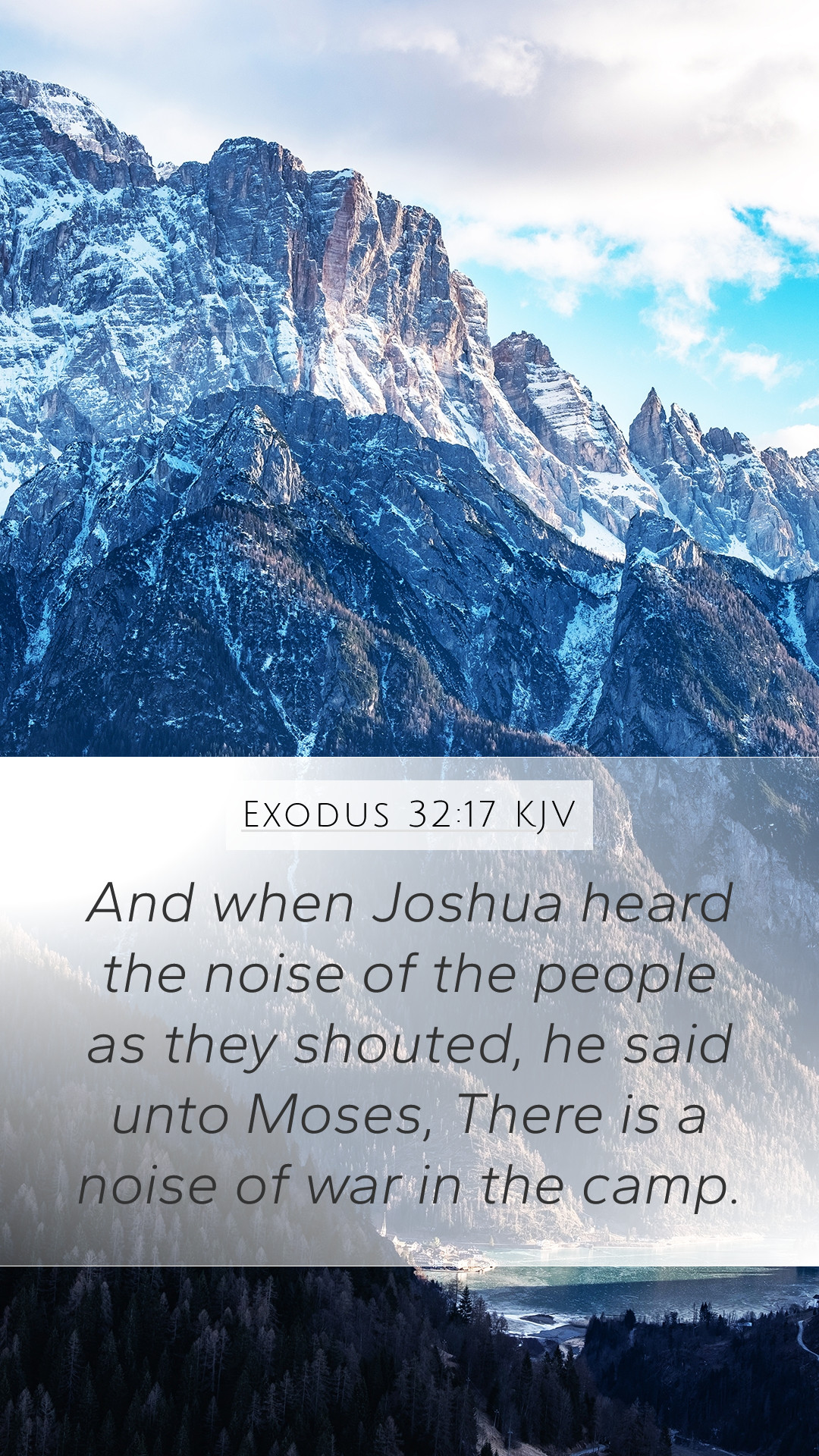Exodus 32:17 - Meaning and Commentary
This verse provides a crucial moment in the narrative of the Israelites' experience in the wilderness, reflecting profound themes of anger, leadership, and judgment. In Exodus 32:17, we see the reaction of Joshua as he hears the noise of the people and comes toward Moses, indicating a critical juncture filled with emotion and significance. Understanding this verse involves delving into several themes and interpretations from esteemed Biblical commentaries.
Overview of Exodus 32:17
As Matthew Henry notes, the context reveals Moses at the summit of Sinai receiving the Ten Commandments while the people below engage in idolatry. Joshua's response to the sounds of revelry prompts a reflection on the nature of leadership amid the people's sin. The divide between Moses and the Israelites is palpable, illustrating the tension of divine law against human disobedience.
Insights from Public Domain Commentaries
- Albert Barnes interprets Joshua's declaration of hearing the noise as a mixture of warlike and joyful sounds. This duality exemplifies the chaos that ensues when a people forsake their covenant with God, leading to both conflict and celebration in their sinful condition. This suggests the complex nature of sin—often celebrated yet fundamentally destructive.
- Adam Clarke emphasizes the importance of Moses' leadership. He notes that Joshua’s initial reaction shows a misunderstanding of the gravity of the situation. It reflects the need for spiritual discernment, as not all noise or celebration signifies righteousness. Clarke points to this as a necessary lesson for leaders in understanding the Source of their directives and the implications of their people's actions.
Meaning of Exodus 32:17
The meaning of Exodus 32:17 extends beyond a mere observation of sounds; it encapsulates the consequences of idolatry and the importance of obedience to God. This moment supports significant biblical themes:
- Divine Judgment: The noise indicates a situation ripe for God's judgment, as the people have turned away from worshiping Him.
- Leadership Responsibility: This moment emphasizes Moses’ role in interceding for the people, demonstrating the weight of leadership in spiritual matters.
- Human Weakness: It highlights the tendency of humanity to stray from God’s commands, reminding believers of the necessity of vigilance and adherence to divine instructions.
Application of Exodus 32:17
Applying the insights of this verse to our lives prompts critical self-reflection and a deepened understanding of our worship practices. We must consider:
- How do we discern genuine worship amidst the distractions and noise of modern life?
- Are we as leaders—whether in the church or in our families—actively guiding others toward God and away from idolatry?
- What steps can we take to ensure that our celebrations and joys align with God's will?
Cross References
- Exodus 32:1-6: Context of the golden calf and the people's rebellion.
- Numbers 12:3: Moses’ humility and position as a leader.
- 1 Corinthians 10:7-8: New Testament reference to idolatry and its consequences.
Conclusion
Exodus 32:17 serves as a poignant reminder of the dangers of turning away from God and the crucial responsibility of spiritual leaders to guide their communities. Through careful study and reflection, believers can derive valuable insights from this passage that apply to both personal and communal aspects of worship. In turning to this text, we engage in a rich tradition of Bible study insights that challenges us to seek a deeper understanding of Scripture.
This commentary is intended for those engaging in Bible study groups, utilizing Bible study tools, and seeking resources to enhance their understanding of Scripture. By exploring such passages, believers can learn how to interpret Bible verses, understand difficult Bible passages, and apply them to daily life.


